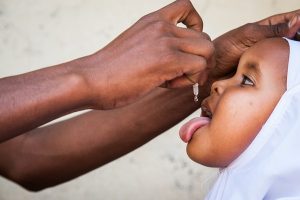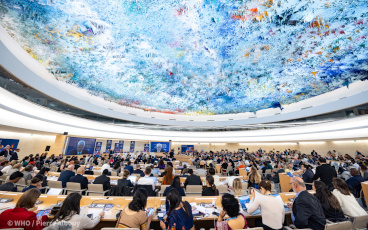Happy World Polio Day 2014
World Polio Day on the 24 October provides an opportunity to reflect on just how far we have come towards eradicating polio for all children, everywhere, forever.

Today is World Polio Day 2014. This is a chance to celebrate just how far we have come in the fight against polio since the Global Polio Eradication Initiative (GPEI) was set up in 1988. In the past 26 years, this has become a truly global movement, made up of governments, international organisations, the private sector, non-governmental organisations, civil society organisations, health workers and countless individuals who have volunteered, sometimes at risk to their lives, to protect children everywhere against polio.
It is an opportunity to reignite international commitment to support the very few countries that still have some way to go to finally finish this disease.
Today should also act as a reminder that, while most of the world’s population now live in polio-free regions, losing momentum and failing to fully eradicate this disease now would be to see polio regain a foothold in many places where it has been long gone. Within ten years, we could see 200,000 new cases every single year. This would be a humanitarian catastrophe that we must avoid at all costs.
We have come very far in the fight against this debilitating disease. Vaccines have been available since the 1950s, and thanks to this it has made polio a thing of the past in most regions of the world. Polio cases have fallen from 1,000 per day in 1988 to less than 1 per day so far in 2014. The number of cases of paralysis caused by polio has been brought down 99% since 1988, protecting over 10 million people who would otherwise have been paralysed for life. Polio remains endemic in only 3 countries: Afghanistan, Nigeria and Pakistan, down from 125 in 1988. Pakistan remains the greatest challenge for global eradication efforts, as home to 85% of cases in 2014 to date. In Nigeria, however, strong progress is continuing, bringing a polio-free Africa closer on the horizon. The next steps will not be easy- it is essential that momentum is maintained across the whole of Africa and that the vaccine derived poliovirus outbreak is also stopped. But Africa is closer than it has ever been.
However, while polio exists anywhere in the world, children everywhere are at risk. This was proved irrevocably in 2013, when the world saw progress towards eradication hampered by outbreaks in the Middle East, the Horn of Africa and central Africa. These outbreaks caused the Director General of the World Health Organization, Dr Margaret Chan, to declare polio a Public Health Emergency of International Concern in May. Countries infected by polio were required to put temporary recommendations in place to stop the international spread of polio. An increasing numbers of polio-free countries – such as Australia, China and India – took extraordinary measures in 2014 to protect themselves from re-infection, by introducing their own vaccination requirements for travellers from infected countries.
For these challenges to be addressed and the final distance between the global community and eradication to be closed, several important steps must be made. Financial resources must be made available and stabilised; high vaccination coverage must be maintained in every region; routine immunization must continue to be strengthened and all recommendations to stop international spread must be implemented. Ending polio is the responsibility of every one of us, whether we act globally or within our own communities.
Even as we prepare ourselves to increase efforts for the final push, today we can all celebrate a number of major milestones in the drive to end this terrible disease.
Firstly, this is the first World Polio Day where the entire South East Asia region is verified to be polio free, following the three year anniversary of India’s monumental achievement in ending the transmission of the virus.
Secondly, 2014 marks the first World Polio Day where Nigeria is on the verge of eradication. From 53 cases in 2013, we are down to just 6 cases this year. The polio program in Nigeria is one of the most innovative in the world, and the long term worth of this investment is demonstrated through the drop in numbers of polio even as the infrastructure has been used to help end the Ebola outbreak there.
Finally, this is the first World Polio Day during which every country across the world has proved that with the right resources and strong political will, every child can be reached with the lifesaving polio vaccine.
With global commitment generated and maintained by partners, governments, donors and volunteers, we can ensure that progress in the next year helps us to achieve more ground breaking progress towards eradication. Both Africa and Pakistan have reached thresholds where the chance to finish the job is within our grasp. This opportunity must not be missed.
” I WORK TO ERADICATE POLIO BECAUSE…
I don’t think there is anything more worthwhile in the field of global health than getting rid of a disease forever. It has only happened once so far, but how much better is our world without smallpox? And how much better will it be without polio?’
MELINDA MAILHOT, GLOBAL POLIO ERADICATION INITIATIVE
Join Rotary today for a live-streamed event on progress towards eradicating polio.













